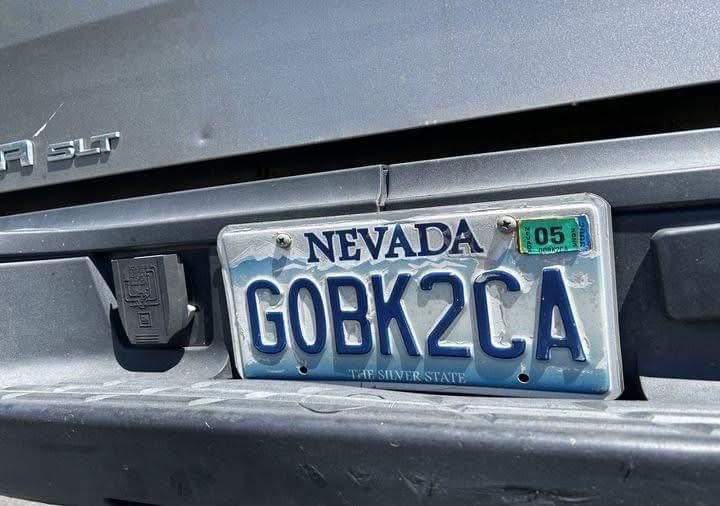Personalized license plates have long been a popular way for drivers to express their individuality, humor, and creativity. But what happens when those personalized messages go too far? Recently, a Nevada license plate with the message “Go back to California” sparked a viral controversy, attracting over 80,000 likes on Facebook. While the plate caught the attention of many, it also raised significant concerns over what is acceptable in the realm of personal expression on public roads.
The Viral Nevada License Plate Incident
The controversial license plate, which featured the message “Go back to California,” quickly gained traction on social media, with users discussing the potential impact of such a message. The plate’s inflammatory nature caught the attention of many who felt the message was derogatory and could contribute to ongoing tensions between Nevada and California residents.
Due to the backlash, the Nevada Department of Motor Vehicles (DMV) took action, recalling the plate. This incident has brought to light the ongoing debate surrounding personalized plates—while they allow for personal expression, they can also raise questions about decency, appropriateness, and whether certain messages should be allowed on public display.
Why Do Personalized Plates Spark Controversy?
Personalized license plates are seen by many as a way to showcase individuality or make a statement. For some, it’s a chance to show off a bit of humor, creativity, or even political opinion. However, not all custom plates are seen in a positive light.
While some drivers use their plates to express funny or quirky messages, others use them to promote controversial or offensive statements. For example, license plates like “SAUC3D” and “RAMP4GE” hint at inappropriate or violent content, while others, such as “F4K3 T4XI” and “BUYAGRAM,” suggest illegal activities. These kinds of plates can be seen as promoting behavior that goes against societal norms or even the law.
DMV’s Role in Ensuring Decency
To prevent problematic plates from making their way onto the roads, the DMV has a review process in place. This review process is designed to ensure that personalized plates don’t violate decency standards or promote harmful actions. If a license plate is found to be offensive, the DMV can deny the request or recall the plate, as it did with the “Go back to California” plate.
This process helps to maintain public decency and prevent messages that could be harmful or offensive from appearing on public display. However, the review process isn’t always perfect. In some cases, applicants whose plates are rejected may feel frustrated, especially when the decision is subjective. What one person sees as harmless humor, another may find deeply offensive.
The Balance Between Personal Expression and Public Decency
The debate over personalized license plates raises important questions about the balance between freedom of expression and public decency. On one hand, individuals should have the right to express themselves creatively, even through their vehicle’s license plate. On the other hand, the public nature of license plates means that certain messages may not be appropriate for widespread viewing.
This dilemma is complicated by the fact that what one person finds acceptable, another might find offensive. In the case of the “Go back to California” plate, for example, some people may see it as a harmless, regional joke, while others may interpret it as a discriminatory or inflammatory message.
Should Stricter Regulations Be Imposed?
Given the increasing popularity of personalized plates and the potential for controversy, many are wondering if the DMV should impose stricter regulations when it comes to approving custom plates. Some argue that a more rigid review process could help prevent offensive messages from slipping through the cracks, while others believe it could stifle creativity and self-expression.
Ultimately, the key challenge is finding a balance that allows for personal expression while also maintaining respect and decency in public spaces. As more people opt for custom plates, the need for clear guidelines and a consistent review process becomes even more important.
In Conclusion
Personalized license plates can be a fun and creative way to express one’s personality, but they can also spark controversy when the messages they carry cross a line. The recent viral incident in Nevada serves as a reminder of the fine line between personal expression and public decency. While the DMV has a process in place to monitor and reject inappropriate plates, the debate continues: How can we strike the right balance between individual creativity and societal norms? As personalized plates continue to gain popularity, this conversation is likely to remain at the forefront of discussions about public expression and decency.

Sophia Reynolds is a dedicated journalist and a key contributor to Storyoftheday24.com. With a passion for uncovering compelling stories, Sophia Reynolds delivers insightful, well-researched news across various categories. Known for breaking down complex topics into engaging and accessible content, Sophia Reynolds has built a reputation for accuracy and reliability. With years of experience in the media industry, Sophia Reynolds remains committed to providing readers with timely and trustworthy news, making them a respected voice in modern journalism.
